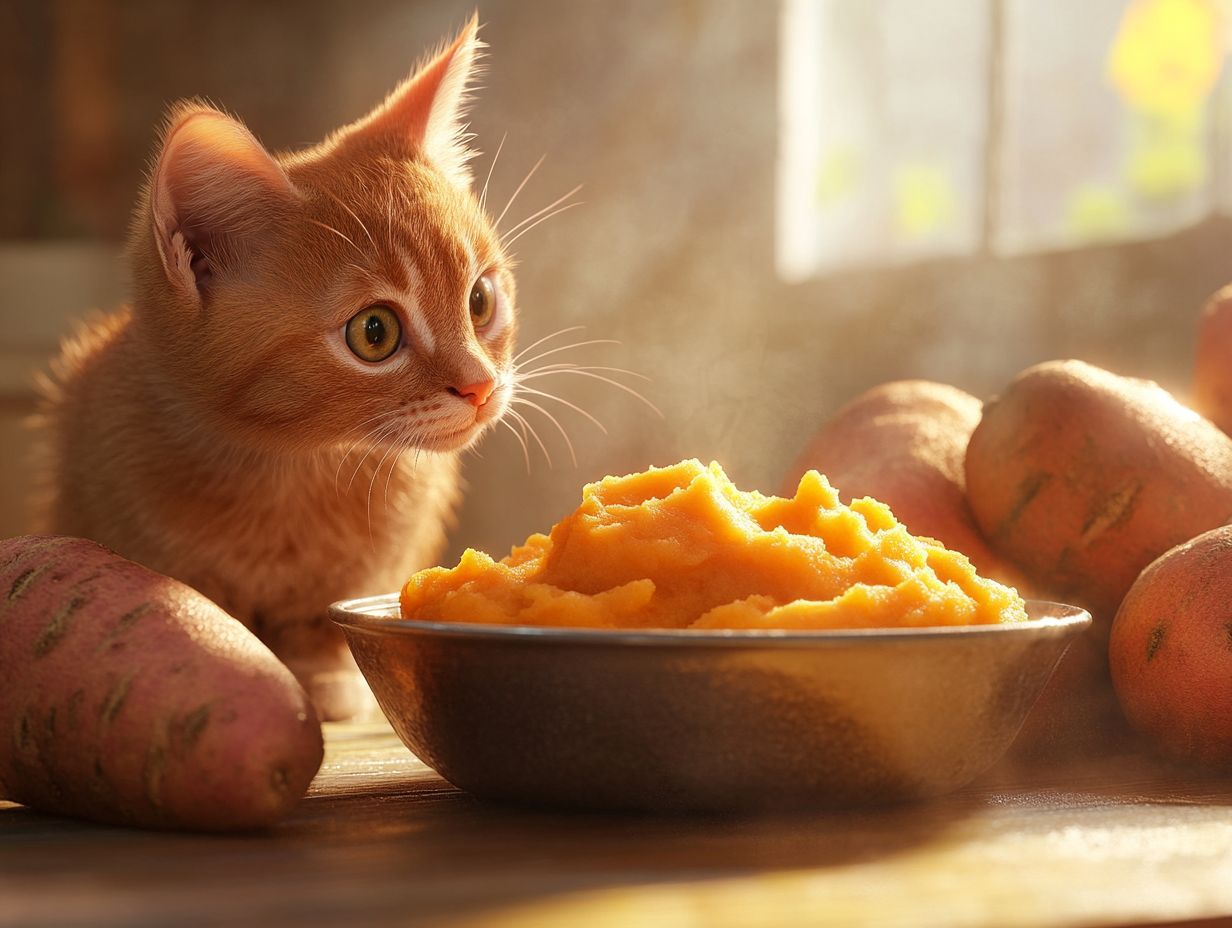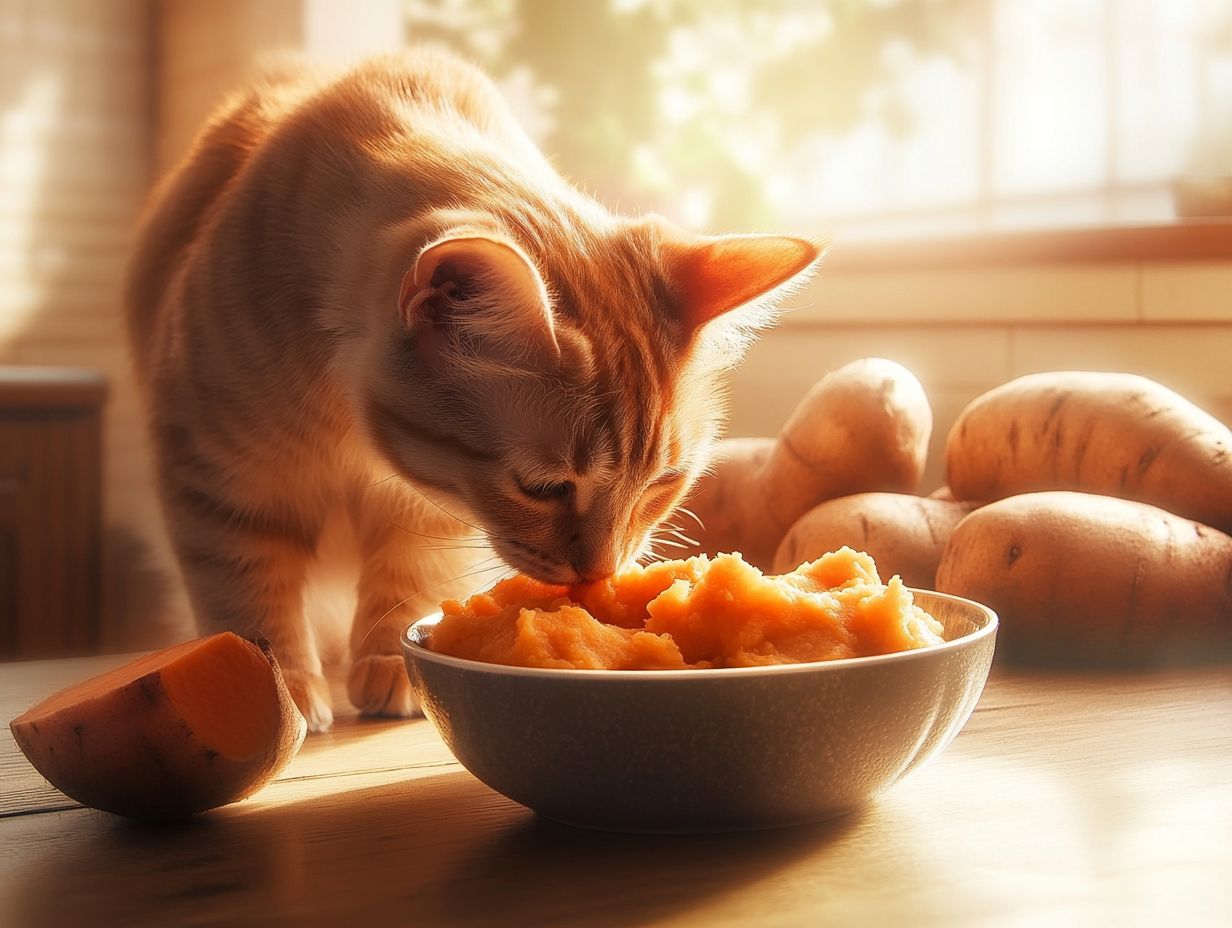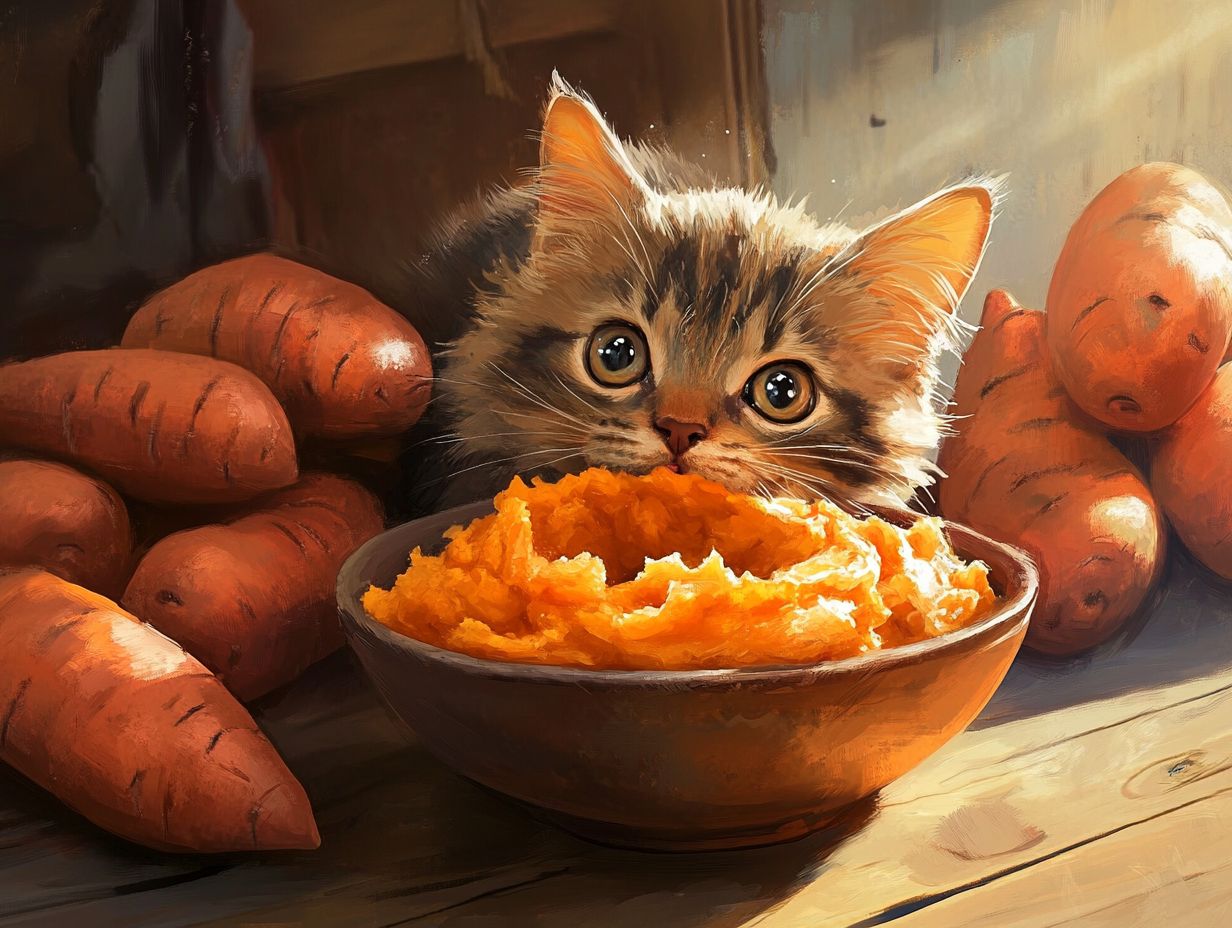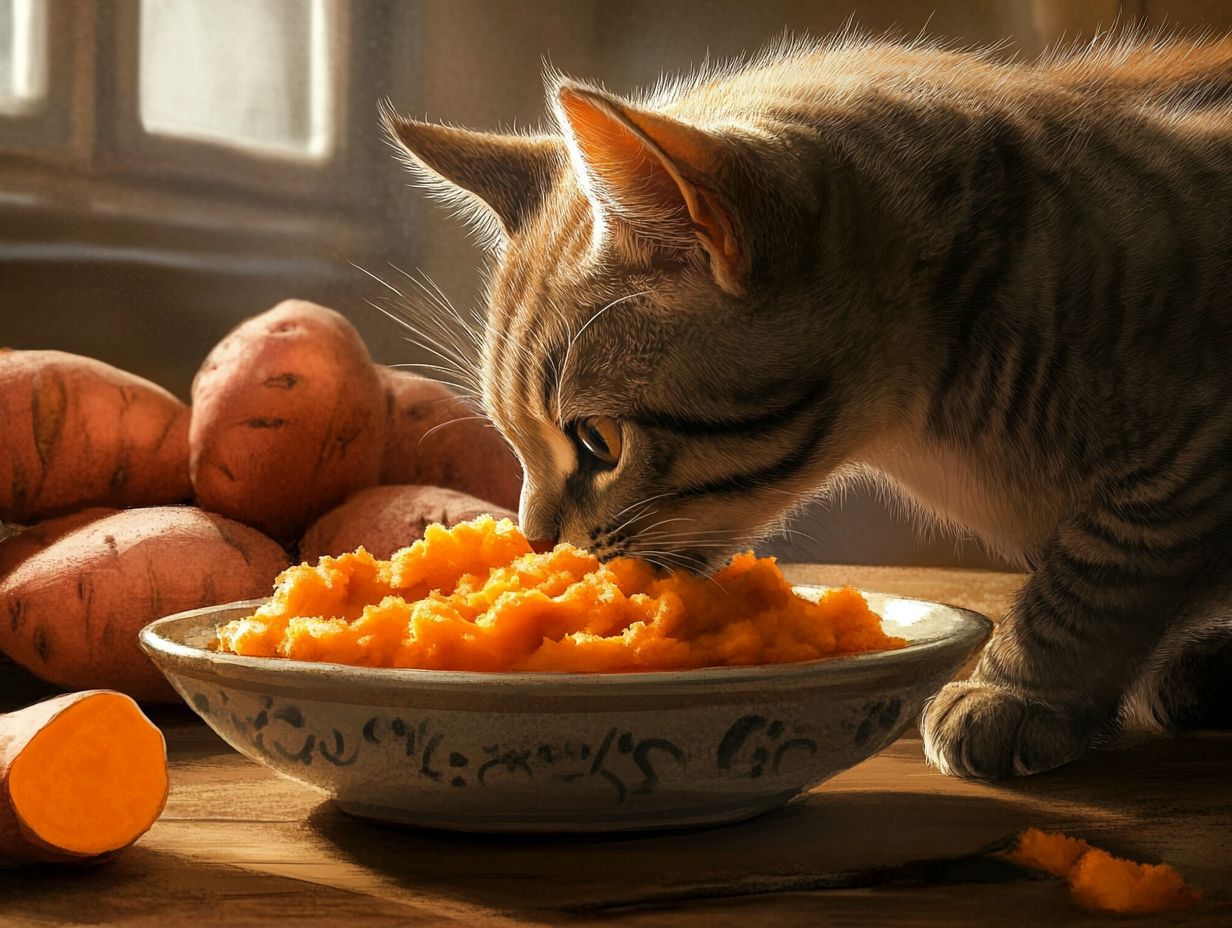If you’re wondering, “Can cats eat sweet potatoes?” you’re not alone! Many cat owners are curious about whether sweet potatoes are a safe and healthy treat for their feline friends. This article will explore the health benefits, potential risks, and safe preparation methods for incorporating sweet potatoes into your cat’s diet.
Sweet potatoes, when prepared correctly, can offer numerous health advantages, including essential vitamins and minerals. However, moderation is key, as they should constitute no more than 10% of a cat’s total daily caloric intake. This guide will also discuss alternative sweet potato treats, potential risks like obesity and gastrointestinal issues, and what to watch out for if your cat has allergies.
Your kitty might just love this new addition to their menu, especially when offered in small amounts as sweet potato mash or sweet potato jerky!
Key Takeaways:

- Sweet potatoes can provide various health benefits for cats, being rich in essential vitamins and minerals.
- Proper preparation and serving of sweet potatoes are vital, following safety guidelines to avoid risks like gastrointestinal upset.
- If your cat has allergies or digestive issues, consult with a veterinarian before introducing sweet potatoes or consider alternative healthy foods for cats.
Overview of Feeding Sweet Potatoes to Cats
Yes, cats can eat sweet potatoes in moderation. As obligate carnivores, they primarily meet their nutritional needs from meat. However, small amounts of sweet potatoes can be a beneficial supplement, providing additional fiber and antioxidants. It’s important to introduce sweet potatoes gradually to maximize benefits and minimize gastrointestinal upset.
Health Benefits and Risks
Feeding sweet potatoes to cats comes with both health benefits and risks.
Benefits:
- Antioxidants: Sweet potatoes are rich in antioxidants, which can enhance a cat’s immune system and may help prevent certain types of cancer.
- Fiber: These vegetables are high in fiber, promoting digestive health and potentially preventing obesity in cats when fed in moderation as part of a balanced, high-protein diet.
Risks:
- Gastrointestinal Upset: The high fiber content in sweet potatoes may lead to gastrointestinal upset if cats consume too much.
- Obesity: Sweet potatoes are high in carbohydrates, which can contribute to obesity if fed excessively. It’s recommended that sweet potatoes make up no more than 10% of a cat’s total daily caloric intake.
- Allergies: Some cats may be allergic to sweet potatoes. Watch for signs such as itching, vomiting, or diarrhea.
Nutritional Value of Sweet Potatoes for Cats
Sweet potatoes can provide nutritional benefits for cats, offering essential vitamins and minerals that contribute to their overall health. They are rich in carbohydrates, making them a good energy source, and they also contain high levels of potassium, vitamin A, and vitamin C, which are crucial for various bodily functions.
Essential Vitamins and Minerals

Sweet potatoes are a rich source of essential vitamins and minerals, particularly vitamins A and C, which support vision, immune response, and overall cell health. Along with vitamin A, sweet potatoes are high in vitamin B6, crucial for protein metabolism and cognitive development. Their dietary fiber content aids digestion, while potassium contributes to blood pressure regulation and muscle function.
Introducing these nutrient-rich foods into a feline’s diet can strengthen their immune system and enhance energy levels. Additionally, the antioxidants in sweet potatoes can fight free radicals, providing extra health benefits.
How to Safely Feed Sweet Potatoes to Cats
Feeding sweet potatoes to cats safely requires understanding appropriate preparation methods and serving sizes. Here are some tips:
- Boil or steam sweet potatoes without any seasoning.
- Start with a teaspoon of mashed sweet potato and monitor your cat for any adverse reactions.
- Gradually increase the serving size as your cat adjusts.
Consider consulting Dr. Charles McMillan from GoodVets in Georgia or reliable sources like PetMD and Spot Pet Insurance for expert advice.
References
In conclusion, sweet potatoes can be a healthy treat for cats when served properly and in moderation. Always consult with a veterinarian when in doubt about introducing new foods to your cat’s diet.
Wondering if sweet potatoes are safe for your feline friend? This article explores the benefits, potential risks, and guidelines for incorporating sweet potatoes into your cat’s diet. Always cook sweet potatoes thoroughly to aid digestion; start with a small amount of cooked sweet potato to help prevent gastrointestinal upset.
Benefits of Sweet Potatoes
Cats can enjoy sweet potatoes as long as they are prepared correctly. Boiling or baking sweet potatoes can soften them and enhance their palatability. This preparation method allows for various treats, such as sweet potato mash or sweet potato jerky. A safe portion could be one teaspoon of mashed sweet potato for an average-sized cat.
Steaming is another excellent way to prepare sweet potatoes, preserving their nutrients while providing a tender texture. Once prepared, serve small portions to prevent overconsumption due to their high carbohydrate content.
Incorporating sweet potatoes into homemade cat treats, like sweet potato biscuits or using them as filling for treats, can be a fun and nutritious option. Owners should introduce sweet potatoes gradually into their cat’s diet and monitor for any signs of digestive upset or allergies.
Risks Associated with Sweet Potatoes
Potential risks of sweet potatoes for cats include gastrointestinal upset and weight gain, particularly significant for cats prone to obesity or with specific dietary restrictions.
Allergies and Digestive Issues
Cats may develop allergies or gastrointestinal issues when transitioning to new foods, such as sweet potatoes. Monitor your pet closely for any adverse reactions. Signs of allergic reactions can include itching, vomiting, or diarrhea. Cats with diabetes or insulin resistance should be particularly cautious.
Gastrointestinal upset can manifest as vomiting or diarrhea, especially in cats that are diabetic or have insulin resistance. To prevent these issues, it’s advisable to introduce new foods gradually by mixing small portions into their regular diet while monitoring any changes in behavior or health. For cats with underlying health conditions, seeking veterinary advice is essential, as veterinarians can provide tailored guidance.
This careful approach helps keep cats safe and healthy while they explore different foods.
Frequently Asked Questions
Can cats eat sweet potatoes?

Yes, cats can safely eat sweet potatoes in moderation as a treat. However, it should not be a staple in their diet, as it can cause digestion issues if consumed in large amounts.
What are the benefits of feeding sweet potatoes to cats?
Sweet potatoes are a good source of vitamins A, C, and B6, as well as fiber and antioxidants. They can help improve digestion and boost immune function in cats.
How should I serve sweet potatoes to my cat?
When serving sweet potatoes, always ensure they are cooked and mashed. Start with a small amount to gauge your cat’s reaction.
Conclusion
While sweet potatoes can be a nutritious treat for cats when prepared properly, moderation is crucial. Always consult your veterinarian if you have concerns about your cat’s diet.
Other Healthy Foods for Cats

Healthy alternatives to sweet potatoes for cats include tuna and broth, which are high in protein and essential nutrients. Finely chopped vegetables, such as peas or carrots, can provide fiber and vitamins. Cooked chicken or turkey offers lean protein necessary for maintaining muscle mass. Additionally, fish like salmon is an excellent choice, supplying omega-3 fatty acids that promote a healthy coat and skin.
Wondering if sweet potatoes are safe for your feline friend? Let’s explore the benefits, potential risks, and how to safely include them in your cat’s diet. Sweet potatoes are packed with vitamins A, C, and B6, along with fiber, making them a nutritious addition when prepared correctly. However, it’s important to consult resources like the ASPCA or a veterinary nutritionist for accurate information.
Potential Risks of Feeding Sweet Potatoes to Cats
While sweet potatoes are generally safe for cats, they can cause digestive issues if fed in large amounts. Always remove skin and seeds before serving. Consult with a veterinarian before incorporating sweet potatoes into your cat’s diet to address specific dietary requirements.
Alternative Ways to Serve Sweet Potatoes to Cats
If your cat doesn’t enjoy mashed sweet potatoes, consider baking them into treats or adding small chunks into their regular food. Sweet potato jerky or sweet potato biscuits are fun alternatives. For safety, offer no more than a teaspoon of mashed sweet potato per serving.
Precautions When Feeding Sweet Potatoes to Your Cat
As with any new food, introduce sweet potatoes slowly and in small amounts to minimize potential digestive issues. Ensure sweet potatoes are fully cooked and properly prepared before feeding them to your cat. Watch for signs of digestive distress, such as vomiting or diarrhea, after introducing new foods.
Key Takeaways
- Sweet potatoes can be a nutritious treat for cats when prepared correctly.
- Always consult a veterinarian before making dietary changes.
- Introduce new foods slowly and monitor your cat for any adverse reactions.
- Keep portions small to avoid digestive issues.
In conclusion, while sweet potatoes can be a tasty addition to your cat’s diet, moderation is key. Always consult with a veterinarian before making significant changes to your cat’s eating habits.